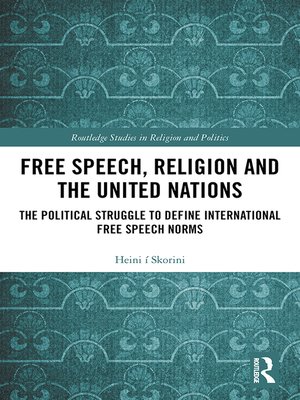Free Speech, Religion and the United Nations
ebook ∣ The Political Struggle to Define International Free Speech Norms · Routledge Studies in Religion and Politics
By Heini í Skorini

Sign up to save your library
With an OverDrive account, you can save your favorite libraries for at-a-glance information about availability. Find out more about OverDrive accounts.
Find this title in Libby, the library reading app by OverDrive.



Search for a digital library with this title
Title found at these libraries:
| Library Name | Distance |
|---|---|
| Loading... |
This book explores the political struggle to interpret and define the meaning, the scope and the implications of human rights norms in general and freedom of expression in particular.
From the Rushdie affair and the Danish cartoon affair to the Charlie Hebdo massacre and draconian legislation against blasphemy worldwide, the tensions between free speech ideals and religious sensitivities have polarized global public opinion and the international community of states, triggering fierce political power struggles in the corridors of the UN. Inspired by theories of norm diffusion in International Relations, Skorini investigates how the struggle to define the limits of free speech vis-à-vis religion unfolds within the UN system. Revealing how human rights terminology is used and misused, the book also considers how the human rights vision paradoxically contains the potential to justify human rights violations in practice. The author explains how states exercise power within the field of international human rights politics and how non-democratic states strategically apply mainstream human rights language and secular human rights law in order to justify authoritarian religious censorship norms both nationally and internationally.
This interdisciplinary book will appeal to scholars and students researching international human rights, religion and politics. The empirical chapters are also relevant for professionals and activists within the field of human rights.







